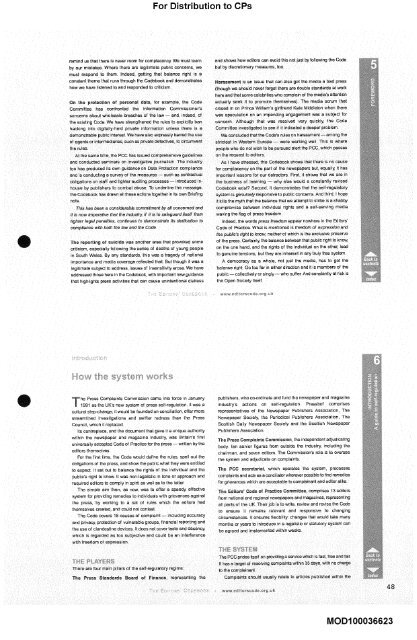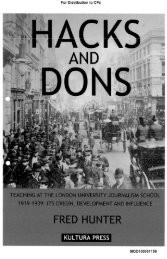The Edi ' - The Leveson Inquiry
The Edi ' - The Leveson Inquiry
The Edi ' - The Leveson Inquiry
You also want an ePaper? Increase the reach of your titles
YUMPU automatically turns print PDFs into web optimized ePapers that Google loves.
For Distribution to CPs<br />
remind us that there is never room for complacency We must learn and shows how editors can avoid this not just by fo!lowing the Code<br />
by our mistakes. Where there are legitimate public concerns we<br />
must respond to them. indeed, getting that ba ance right is a<br />
but by discretionary measures, too.<br />
constant theme that runs through the Codebook and demonstrates Nerassment is an issue that can also get the media a bed press<br />
mow we have listened to and responded to criticism (though we should never forget there are double standards at work<br />
here and that some celebrities who complain of the media’s attention<br />
On the protection of personst data, for example, the Code actually seek it to promote themse~vas). <strong>The</strong> media scrum that<br />
Committee has confronted the Information Commissioner’s closed in on Prince William’s girlfriend Kate Middleton when there<br />
concerns about wholesale breaches of the law -- and, indeed, of was speculation on an impending engagement was a subject for<br />
the existing Code. We have strengthened the rules to explicitly ban concern. Although that was resolved very quickly, the Code<br />
hacking into digitally-held private information unless there is a Committee investigated to see ~f it indicated a deeper problem.<br />
demonstrable public interest. We have aiso expressly barred the use We concluded that the Code’s rules on harassment --among the<br />
of agents or intermediaries, such as private detectives, to circumvent strictest in Western Europe -- were wsrkthg well. This is where<br />
the rules<br />
people who do not wish to 3e pursued alert the PCC, which passes<br />
At the same time, the PCC has issued comprehensive guidelines on the request to editors.<br />
and conducted seminars on investigative journalism. <strong>The</strong> industry As ] have stressed, this Codebook snows that there ~s no cause<br />
too has produced its own guidanca on Data Protection compliance for complacency on the part of the newspapers but, equally it has<br />
and is conducting a survey of the measures-- such as contractual important lessons for our detractors. First, it shows that we are in<br />
obligations on staff and tighter auditing processes--- introduced in- the business of learning -- why else would a constantly revised<br />
house by publishers to combat abuse. To underline the message, Codebo0k exist?. Second, it demonstrates that the self-regulatory<br />
the Codebcok has drawn all these actions together in its own Briefing system is genuinely responsive to public concerns. And third, ] hope<br />
note.<br />
it kills the myth that the balance that we attempt to strike is a shabby<br />
This has been a considerable commitment by all concerned and compromise between individual rights and a self-serving media<br />
it is now imperative that the industry, if it is to safeguard itself from waving the flag of press freecom.<br />
tighter legal penalties, continues to demonstrate its dedication to teceed, the words press freedom appear nowhere in the <strong>Edi</strong>tors’<br />
compliance with both the law and the Code<br />
Code of Practice. What is mentJonee is freedom of expression and<br />
the public’s righ~ to know, neither of which is the exclusive preserve<br />
<strong>The</strong> reporting of suicide was another area that provoked some<br />
of the press. Certainly, the balance between that public right to know,<br />
criticism, aspecla ly following theserias of deaths of young people on the one hand, and the rights of the individual on the other, lead<br />
in South Wales By any standards, this was a tragedy of national to genuine tensions, but they are inherent in any truly free system.<br />
/mportenca and media coverage reflected that. But though it was a A democracy as a whole, not just the media, has to get the<br />
legitimate subject to accrass, issues of insensitivity arose. We have balance right. Go too far In either diractton ant it is members of the<br />
addressed those here in the Codebook, with importan[ new guidance public -- collectively or singly -- who suffer. And constantly at risk is<br />
that highlights press activities that can cause unintentional distress the Open Society itseE<br />
<strong>The</strong> Press complaints commiss on came nto force n January<br />
1991 as the UK’s new system of press self-regulation. It was a<br />
cultural step-change; it would be founded on conciliation offer more<br />
streamlined investigations and swifter redress than the Press<br />
Council, which it replaced.<br />
Its centrapleca, and the document that gave it a umque authority<br />
within the newspaper and magazine industry, was Britain’s first<br />
universally accepted Code of Practice for the press -- written by the<br />
editers themselves<br />
For the first time, the Code would define the rules spell out the<br />
obligations of the press, and show the public what they were entitled<br />
to expect. It set out to balance the rights of the ins vidual and the<br />
public’s right to know. tt was non-legalistic in tone or approach and<br />
required editors to comply m spirit as wstt as to the lette~<br />
<strong>The</strong> simple aim then, as now. was to offer a speedy, effective<br />
system for providing remedies to individuals with grievances against<br />
the press, by working to a set of rules which the editors had<br />
themselves created, and could not contest<br />
<strong>The</strong> Code covers 16 causes of complaint --~nclud~ng accuracy<br />
an0 privacy, protection of vulnerable groups, financial reporting and<br />
the use of clandestine devices. It does not cover taste and decency,<br />
which is regarded as too subjective and could be an interference<br />
with freedorr of expression.<br />
publishers, who co-ordinate and t~Jnd the newspaper and magazine<br />
ndustrys actions on self-regulation. Prassbof comprises<br />
representatives of the Newsoaper Publishers Association, <strong>The</strong><br />
Newspaper Society, tl~e Perlodlce Publishers Association, <strong>The</strong><br />
Scottish Daily Newspaper Society and the Scottish Newspaper<br />
Publishers Association.<br />
<strong>The</strong> Press Complaints Commissten, the independent adjudicating<br />
body: ten senior figures from outside the industry, including the<br />
cl~a~rman, and seven editors. <strong>The</strong> Commission’s rele is to oversee<br />
the system and adjudicate on complaints.<br />
<strong>The</strong> PCC secretariat, which operates the system, processes<br />
complaints and acts as a conciliator wherever possible to find remedies<br />
for grievances which are acceptable to complainant and editor alike<br />
<strong>The</strong> <strong>Edi</strong>tors’ Coda of Practice Committee, comprises 13 editors<br />
from national and reg~ona~ newspapers and magazines, representing<br />
all parts of the UK. <strong>The</strong>ir job is to write, review and revise the Cede<br />
to ensure it remains relevant and responsive to changing<br />
circumstances, it ensures flexibility: changes that would take many<br />
months or years to introduce m a ~egstistic or stetutery system can<br />
be agreed and implemented within weeks<br />
MOD100036623<br />
48
















